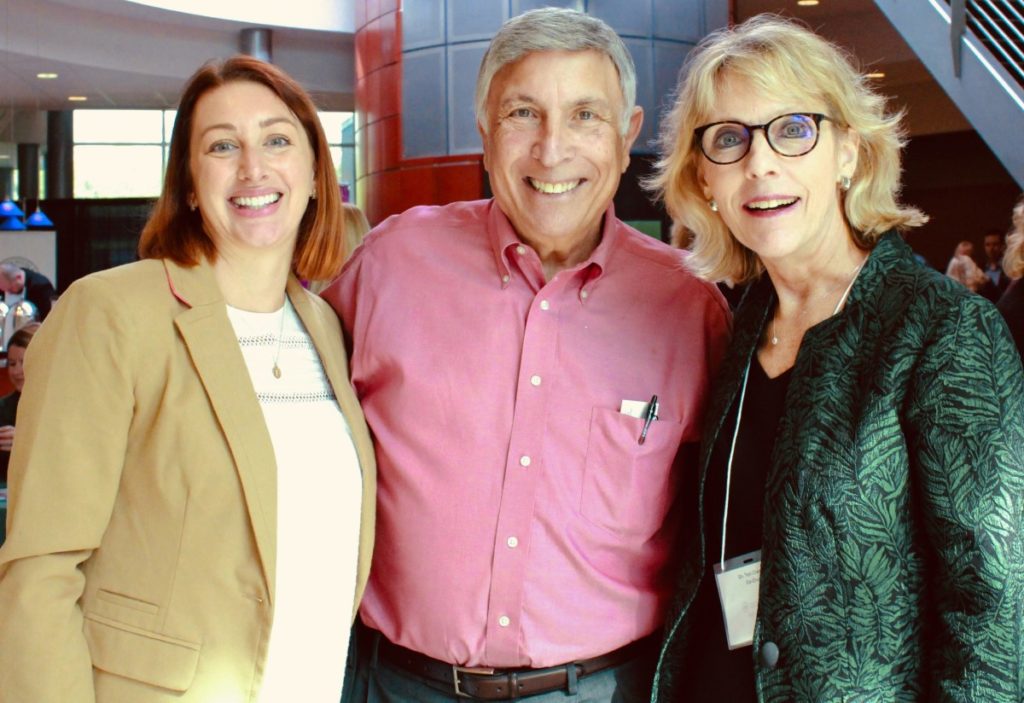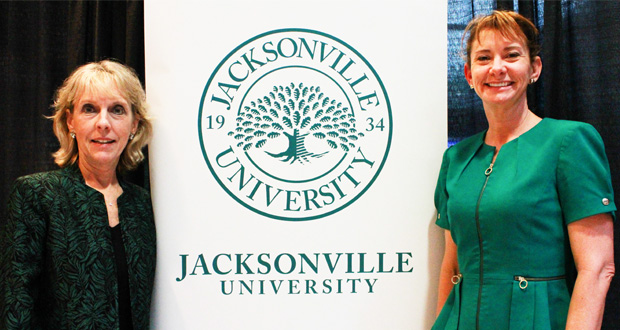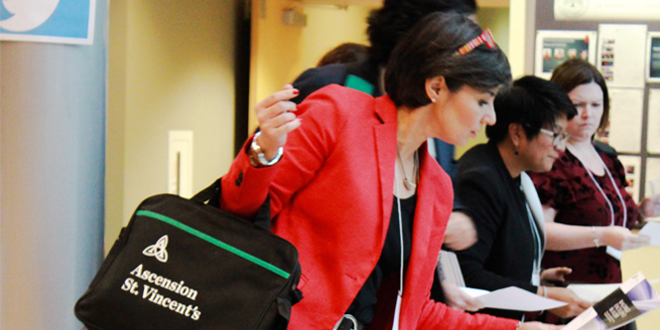By Sheri Webber
About one in four human trafficking survivors come into contact with a healthcare professional at some point. But some members of the medical community feel they lack the awareness, training, and collaborative network necessary to combat the growing $9.8 billion dollar industry now affecting every state in the U.S.
Recently capturing national news headlines, sex trafficking is no longer an underworld myth easily ignored. A sting operation at five “spas” along Florida’s East Coast resulted in nearly 50 arrests and more than 170 warrants. The investigation began with a report to local law enforcement, filed by a health provider, which led to the rescue of an undisclosed number of women—many of whom had newly immigrated to the U.S. seeking a better life.
Jacksonville University’s Quality and Safety Education for Nurses (QSEN) Institute Regional Center hosted its 2019 annual Patient Safety Forum to tackle big issues in patient safety, including human trafficking and the role healthcare providers play in addressing this pervasive issue.

Once again a sold-out event, the Forum welcomed students, safety professionals, policymakers, compliance professionals, pharmacists, risk managers, and medical professionals from across Northeast Florida. Jacksonville University’s Dr. Teri Chenot and Dr. Roberta Christopher organized and chaired the all-day conference, while City Councilmember Tommy Hazouri, Jacksonville University President Tim Cost, Interim Provost Dr. Chris Sapienza, and Interim Dean Dr. Cheryl Bergman also attended.
From a Healthcare Perspective
Dr. Steven A. Godwin, chairman and chief of service of the Department of Emergency Medicine and assistant dean at the University of Florida College of Medicine Jacksonville, moderated the human trafficking panel, which included:
- Marina Anderson, Regional Human Trafficking Coordinator for Northeast and Northwest Regions, Department of Children and Families
- Mac Heavener, Chief Assistant State Attorney
- Dr. Phyllis Hendry, Assistant Chair for Research, Department of Emergency Medicine, University of Florida College of Medicine in Jacksonville and Trauma One Deputy Medical Director
- Dr. LaWanda Ravoira, President and CEO, Delores Barr Weaver Policy Center.
Godwin led the discussion by asking panelists why there was not more public outrage surrounding trafficking. The simple answer: lack of knowledge.
All four panelists agreed. Anderson pointed out that minors affected by trafficking did not necessarily originate from at-risk populations, such as those in the Department of Juvenile Justice system, foster care, or drug rehabilitation environments.
“They are your children, our children,” Anderson said, and outted both social media and gaming platforms as the main lures for victims. Ten of the most played games in America have zero regulations to ban the presence of sexual predators and offenders or traffickers posing as fellow gamers, according to Anderson.
She reiterated that one of the challenges of combating human trafficking is the reality that children with no known risk factors are being impacted.
“Do you have a child? Then that’s your risk factor,” Anderson said.
Hendry discussed the need for healthcare provider training in recognizing the signals or “red flags” of those being victimized. Shared Hope International served as a QSEN exhibitor and provided a list of warning signs:
- Signs of trauma
- Presence of a much-older boyfriend
- Homelessness
- Chronic running away
- Substance abuse
- Specific tattoos
Lack of proper identification and a reluctance to share information with authorities, Hendry added, are also indications that a minor seeking emergency care could be a victim of trafficking. Emergency providers recognizing possible victims in a healthcare setting, she said, is vital.
From a Public Policy Perspective
Ravoira confirmed that Florida’s Safe Harbor laws are among the most effective in the nation, and said, “It’s one thing to have a great law, but if you don’t have the underpinnings of a great support network, where does that leave you?”
The 2012 Florida Safe Harbor Act mandated that children victimized by traffickers be provided with therapeutic follow-up services but did not dedicate funding to support the provision. In response to this lack of support, Ravoira, the Delores Barr Weaver Policy Center, and The Children’s Campaign worked together to establish the Open Doors Outreach Network. In the first 18 months of the initiative, more than 100 children have been served. Since its inception, Open Doors has been replicated in 30 Florida counties with a goal of soon reaching all 47.
“Scrub language” is what Ravoira called labels like “commercial sexual exploitation” and challenged Forum attendees to call these atrocities by their true names of child abuse and child rape. From a public policy perspective, minors who have been trafficked are frequently marked by criminal charges that prevent them from later securing employment or housing. Because of this “lifetime sentence,” Ravoira said that much of the Policy Center’s efforts include the expunging of juvenile records to help victims reclaim their future.
Hot Lines & Next Steps
During a Q&A session, Forum attendees asked panelists a variety of questions, including what measures are currently in place to educate students. Anderson confirmed that Duval County Public Schools receive educational resources through school assemblies and eighth-grade health classes. These efforts, she said, focus primarily on teaching online safety.
Attendees also asked about closing feedback loops with medical personnel who alerted law enforcement to possible cases of trafficking. Healthcare providers in the room expressed a keen interest in receiving additional data points and/or patient updates to inform their processes going forward when identifying victims.
To download any of today’s presentations, visit the Patient Safety Forum 2019 online.
- National Human Trafficking Hotline (888) 373-7888
- Local Open Doors Network Hotline (904) 412-8923

About the QSEN Institute Regional Center at Jacksonville University
Its third annual statewide conference, the Patient Safety Forum was made possible by Jacksonville University’s premier Quality and Safety Education for Nurses (QSEN) Institute Regional Center, one of only three in the nation. The goal of QSEN is to create an international network of healthcare professionals who contribute to quality and safety educational resources and scholarship.
 Wave Magazine Online Jacksonville University News Hub
Wave Magazine Online Jacksonville University News Hub
